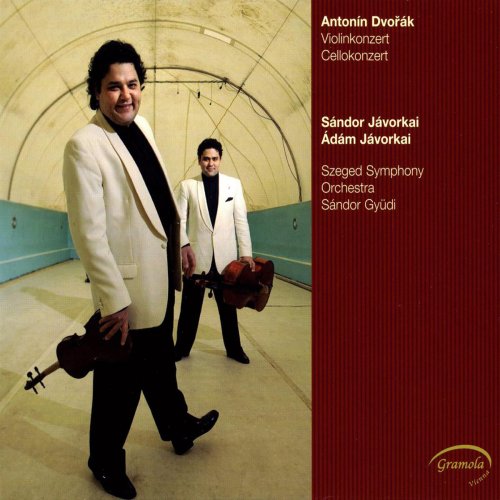
Sándor Jávorkai, Ádám Jávorkai, Szeged Symphony Orchestra, Sándor Gyüdi - Dvorak: Violin Concerto - Cello Concerto (2009)
BAND/ARTIST: Sándor Jávorkai, Ádám Jávorkai, Szeged Symphony Orchestra, Sándor Gyüdi
- Title: Dvorak: Violin Concerto - Cello Concerto
- Year Of Release: 2009
- Label: Gramola Records
- Genre: Classical
- Quality: flac lossless (tracks) +Booklet
- Total Time: 01:12:56
- Total Size: 359 mb
- WebSite: Album Preview
Tracklist
01. Violin Concerto in A minor, Op. 53, B. 96: I. Allegro ma non troppo
02. Violin Concerto in A minor, Op. 53, B. 96: II. Adagio ma non troppo
03. Violin Concerto in A minor, Op. 53, B. 96: III. Finale: Allegro giocoso, ma non troppo
04. Cello Concerto in B minor, Op. 104, B. 191: I. Allegro
05. Cello Concerto in B minor, Op. 104, B. 191: II. Adagio ma non troppo
06. Cello Concerto in B minor, Op. 104, B. 191: III. Finale: Allegro moderato
Despite a gap of more than a dozen years, the violin and cello concertos of Antonin Dvorák bare a number of similarities. Both rely on extensive, robust orchestral tuttis; both feature extremely virtuosic solo parts; both are filled with memorable, sweeping melodies; and both have easily secured a spot in the modern canon. The road to completion of the Violin Concerto was long and difficult; Dvorák wrote the original score with infamous violinist Joseph Joachim in mind, but after two years of back-and-forth revisions, Joachim never actually played the piece. Nevertheless, the concerto easily found its way into the heart of the violin concerto repertoire. The cello concerto came about with much less drama and is now perhaps the most widely performed of all cello concertos. Performing these core works of the repertoire on this Gramola album are brothers Sándor Jávorkai (violin) and Ádám Jávorkai (cello) with the Szeged Philharmonic Orchestra. Both brothers possess a commanding technique, developed musical insight, and a clear passion for the music at hand. Of the two performances, the violin concerto may be only slightly weaker than the cello concerto, with Sándor occasionally struggling with precise intonation in the middle movement. The orchestral accompaniment in both cases is given an enthusiastic though sometimes rough-around-the-edges reading by the Szeged musicians, which is certainly regrettable given the importance of the orchestral tuttis. Still, as an introductory recording to these wonderful concertos, this album is a reasonable choice.
01. Violin Concerto in A minor, Op. 53, B. 96: I. Allegro ma non troppo
02. Violin Concerto in A minor, Op. 53, B. 96: II. Adagio ma non troppo
03. Violin Concerto in A minor, Op. 53, B. 96: III. Finale: Allegro giocoso, ma non troppo
04. Cello Concerto in B minor, Op. 104, B. 191: I. Allegro
05. Cello Concerto in B minor, Op. 104, B. 191: II. Adagio ma non troppo
06. Cello Concerto in B minor, Op. 104, B. 191: III. Finale: Allegro moderato
Despite a gap of more than a dozen years, the violin and cello concertos of Antonin Dvorák bare a number of similarities. Both rely on extensive, robust orchestral tuttis; both feature extremely virtuosic solo parts; both are filled with memorable, sweeping melodies; and both have easily secured a spot in the modern canon. The road to completion of the Violin Concerto was long and difficult; Dvorák wrote the original score with infamous violinist Joseph Joachim in mind, but after two years of back-and-forth revisions, Joachim never actually played the piece. Nevertheless, the concerto easily found its way into the heart of the violin concerto repertoire. The cello concerto came about with much less drama and is now perhaps the most widely performed of all cello concertos. Performing these core works of the repertoire on this Gramola album are brothers Sándor Jávorkai (violin) and Ádám Jávorkai (cello) with the Szeged Philharmonic Orchestra. Both brothers possess a commanding technique, developed musical insight, and a clear passion for the music at hand. Of the two performances, the violin concerto may be only slightly weaker than the cello concerto, with Sándor occasionally struggling with precise intonation in the middle movement. The orchestral accompaniment in both cases is given an enthusiastic though sometimes rough-around-the-edges reading by the Szeged musicians, which is certainly regrettable given the importance of the orchestral tuttis. Still, as an introductory recording to these wonderful concertos, this album is a reasonable choice.
As a ISRA.CLOUD's PREMIUM member you will have the following benefits:
- Unlimited high speed downloads
- Download directly without waiting time
- Unlimited parallel downloads
- Support for download accelerators
- No advertising
- Resume broken downloads


